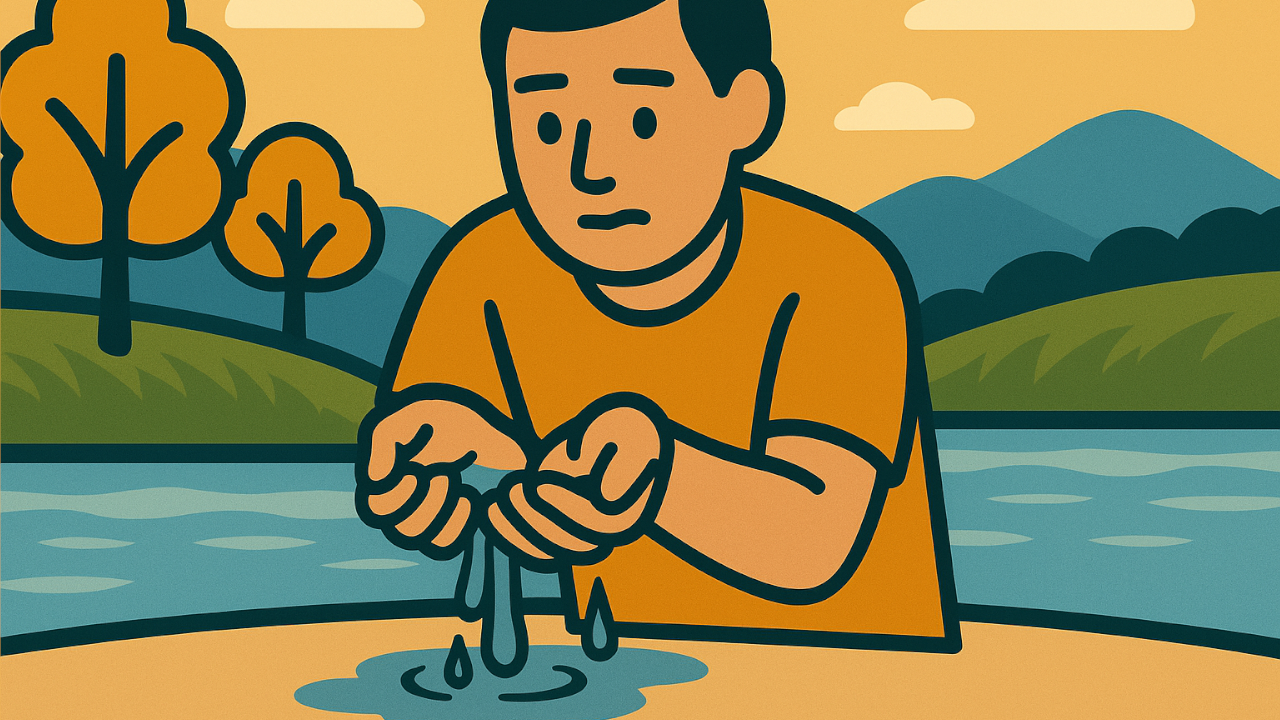How to Read “上手の手から水が漏れる”
Jouzu no te kara mizu ga moreru
Meaning of “上手の手から水が漏れる”
This proverb means that no matter how excellent someone’s skills or abilities are, they sometimes make mistakes or fail.
Even skilled craftsmen and experts are not perfect. It’s not uncommon for people with years of experience and high-level skills to make unexpected mistakes in a moment of carelessness. This doesn’t indicate a lack of ability, but rather teaches us that it’s a natural thing that cannot be avoided as long as we are human.
This proverb is used when an excellent person makes an unexpected mistake. It’s not used for criticism, but rather to show warm understanding by saying “these things happen.” It can also be used as comfort when you yourself make a mistake, to prevent excessive disappointment. For modern people who tend to fall into perfectionism, this expression can be a source of emotional support. It’s a gentle proverb that helps us accept our humanity and gives us the courage to continue challenging ourselves without fearing failure.
Origin and Etymology
The origin of this proverb is thought to be deeply rooted in the craftsman culture of the Edo period. The theory that it originated from professions that handled water, such as bucket makers and barrel makers, is considered most likely.
Buckets and barrels of that time were made by precisely combining wooden materials, and even for skilled craftsmen, preventing water leaks completely was extremely difficult. Even buckets made by the most skilled craftsmen would sometimes leak water through tiny gaps. This realistic experience is thought to have become established as a proverb.
Another theory suggests it originated from the world of tea ceremony. In the tea ceremony, the act of pouring water is highly valued, but even the most skilled tea masters would sometimes spill water. Precisely because the world of tea ceremony seeks perfection, such small failures may have been memorably impressed upon people and passed down as lessons.
Since similar expressions can be found in Edo period literature, it’s presumed that this proverb was already being used among people at least several hundred years ago. It’s a profound expression that contains both respect for craftsmen’s skills and the Japanese value of accepting human limitations.
Usage Examples
- Even that famous doctor sometimes makes misdiagnoses – this is truly “Skilled person’s hand from water leaks”
- A veteran chef forgetting to add salt – I suppose this is “Skilled person’s hand from water leaks”
Modern Interpretation
In modern society, the meaning of this proverb has come to feel deeper and more complex. In our information society, the failures of experts and celebrities are instantly spread around the world and often subjected to harsh criticism. On social media, voices saying “Why would a professional do this?” and “If they’re getting paid, they should be perfect” fly around.
However, with technological advancement, we are now required to perform much more complex and sophisticated tasks than before. Doctors make final decisions while using AI diagnostic support, and engineers strive to keep up with daily technological progress. In such an environment, “Skilled person’s hand from water leaks” could be said to be a natural phenomenon.
Interestingly, in modern times, there’s also a tendency to find value in “imperfect humanity.” On YouTube and TikTok, content showing moments when professionals fail or displaying imperfect processes has become popular. People empathize with and feel affinity for the process of trial and error rather than perfect results.
This proverb has actually increased in importance in modern times. Against the tendency to not challenge oneself for fear of failure, it gives us the courage to say “Even skilled people leak water, so let’s try it first.”
When AI Hears This
The greatest trap that experts fall into is a cognitive pitfall called “automation bias.” The more skilled we become, the more our brains automate processes and shift conscious attention elsewhere. This is precisely what lies behind the phenomenon of “even experts make careless mistakes.”
In the 2016 Tesla autopilot accident, a driver who over-relied on the driving assistance system neglected basic forward monitoring, resulting in a fatal crash. In medical settings, research has revealed that experienced radiologists tend to accept AI diagnostic results without question, undervaluing their own fundamental image interpretation skills.
Psychologist Daniel Kahneman pointed out in his book “Thinking, Fast and Slow” that experts are more likely to rely on “System 1 thinking” (intuitive, automatic judgment) while neglecting “System 2 thinking” (logical, conscious verification). In fact, statistics prove that veteran investors often underperform newcomers precisely because experience breeds complacency that leads to neglecting basic risk management.
In our modern AI era, this ancient proverb takes on new meaning. The more we rely on technology, the more our fundamental human abilities atrophy, and we lose critical judgment when it matters most. True expertise means maintaining the humility of a beginner at all times.
Lessons for Today
What this proverb teaches us modern people is the danger of seeking perfection too much and the importance of accepting failure. Don’t you sometimes see only others’ successes on social media and feel depressed about your own imperfections?
But think about it. That person you respect must also be accumulating small failures in places you can’t see. That’s not something to be ashamed of, but proof that they continue to grow. When you challenge yourself with new things, “water will always leak.”
What’s important is not to do nothing for fear of failure, but to learn from failure and stand up again. When you’re assigned a new project at work, when you start learning something new, when you’re troubled by relationships, tell yourself that it’s okay not to be perfect.
Your “water leaks” are proof that you’re working seriously. And that imperfection is what makes you human and attractive. Today too, let’s move forward with confidence, leaking a little water along the way.



Comments